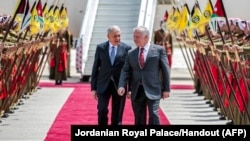Jordan’s King Abdullah says his country will not be a battleground for any party in the confrontation between Israel and Iran and the protection of its citizens and sovereignty are paramount.
Iran’s recent attack on Israel underscores Jordan’s delicate geopolitical location. The kingdom was geographically sandwiched, sitting between Israel on one side and Iran and its proxies on the other - as Iranian drones and ballistic missiles flew over Jordanian airspace on their way to Israeli targets.
In remarks to U.S. President Joe Biden, King Abdullah defended his military’s actions in helping intercept and shoot them down saying Jordan’s security and the protection of its citizens come above all other considerations.
He said Jordan would not be a “theater of war” for any side, nor will it allow a regional war to unfold on its land.
Jordanian analyst Osama Al Sharif told VOA that Jordan is in a delicate position.
“It has to protect its sovereignty. It does not want to be dragged into an open conflict whether on the Iranian side or the Israeli side. The situation in Jordan is emotionally charged because of Gaza. For the last 6 months we have had almost weekly protests—very anti American, very anti-Israeli—they are not in a position to understand the very delicate situation that Jordan finds itself in. It wants to bring attention back to the Gaza war—the humanitarian crisis unfolding,” he said.
Analyst Amer Al Sabaileh said that from the start of the Gaza conflict, leaders sensed the danger that it could escalate to a larger regional crisis that is already evident in Syria, Lebanon and the Red Sea. Now, he said Jordanians got a taste of the conflict when they saw the missiles and drones being intercepted in the skies above them.
“It made people worry and see that it might have concrete consequences in Jordan and therefore His Majesty’s word is definitely reassuring and very clear that the priority for Jordan is the Jordanian security, stability, and security of its own people,” he said.
Al Sabaileh said that while Iran could have launched its attacks from the territories of their allies in Syria or Lebanon, it chose the route over Jordanian airspace purposely: Iranian-backed groups in Syria have tried to infiltrate northern Jordan with drugs and weapons in past months.
“We cannot see the Iranian attack far from the real risk that it represents for Jordan. It was obvious that the whole attack was concentrated in Jordan. It’s not seen far from what was going also on the ground in recent months from the northern borders to even trying to mobilize people inside Jordan. The strategy of Jordan is to send a clear and firm message that we will go against any attempt of violating of our sovereignty,” he said.
Kristian Coates Ulrichsen is a Middle East specialist at Rice University’s Baker Institute in Texas. He told the online Breaking Defense publication that “Iraq also could have intercepted munitions that overflew its airspace but chose not to due to “political dynamics.”
Shortly after the attacks, Jordan’s foreign ministry summoned Iran’s ambassador over Iranian media comments in which the Iranian leadership appeared to threaten Jordan for joining the U.S.-led effort to support Israel. The reports said that if Jordan intervened, it would become the “next target.”
In response, Iran’s Foreign Ministry issued a statement Monday saying it wants to maintain good ties with Jordan.




